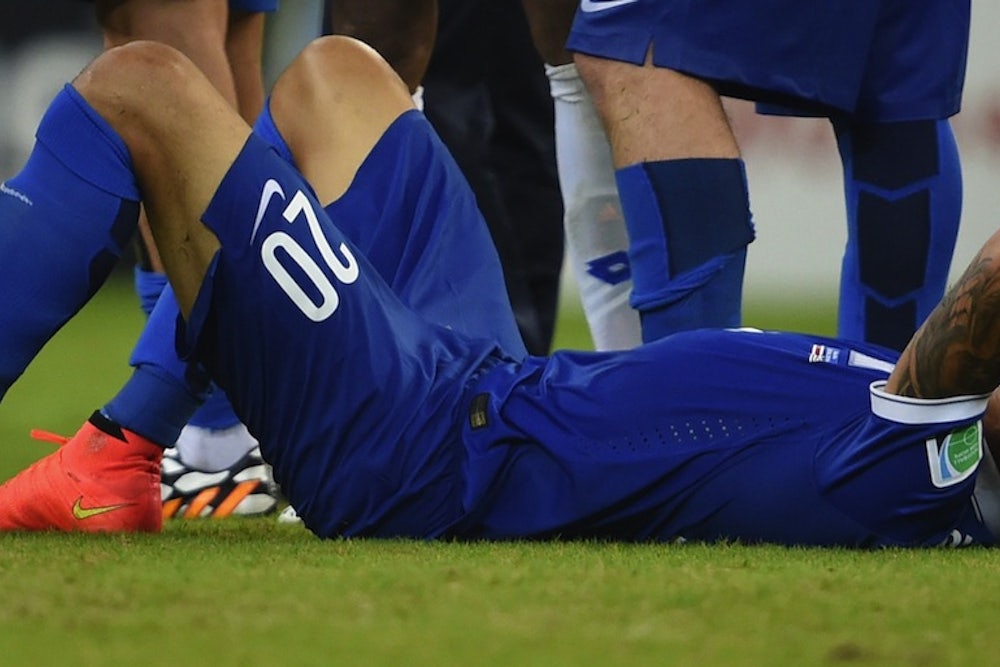In the end, not even Greece’s Gods could save her. It seems that the penalty shoot-out belongs so squarely and brutally in the realm of chance that it was beyond even their powers of intervention. For once in a high-stakes match, she had been the better side. But she had proved unable to kill off the surprisingly meek Costa Ricans, who had been playing since the 66th minute with 10 players. The Central American team was able to hold on until the end of extra time and relief at this seemed to turn into boundless confidence during the penalties. The Greeks matched them goal for goal until the fourth, when the Costa Rican keeper Keylor Navas produced a spectacular one-handed save to deny Fanis Gekas. The next shot sent Costa Rica into the quarterfinals for the first time in its history and left Greek fans tasting an unfamiliar flavour: the bitterness of undeserved defeat.
Before the pain, there had been hope. In the early stages of the tournament, and especially after the 3-0 drubbing at the hands of Colombia, the collective mood in the country was one of ubiquitous pessimism about the team’s prospects—a pessimism often tinged with biting critiques of the players, covering everything from their commitment to their hairstyles. But after Greece beat the Ivory Coast in stoppage time to make it past the group stage for the first time in three World Cup appearances, the mood shifted instantly to euphoria. The fever of 2004 was back with a vengeance. After a long time, people had something to smile about. Our internationals and coach Santos were hailed as demi-gods, all criticism was silenced and sports commentators made projections about who Greece was likely to meet in each subsequent round, all the way to the final.
The contingent that had bonded a few days earlier watching Greece’s triumphant scramble into the round of 16 was back at the same rooftop terrace were we had watched the Ivory Coast game the previous Tuesday. The only person on the scene missing was—not the Jack of Hearts, as the song says, but—my Greek-American friend, who had already flown back to Washington. Indeed the crowd was considerably larger than on Tuesday and growing more raucous with every passing minute as kick-off approached. Our host warned us that he had received complaints from a neighbour during the Ivory Coast match and that we had to keep it down. As time passed and he realized the futility of his admonitions, they became a running joke. He kept saying the words, but the tone was one of self-mockery.
From the start, it was clear that Costa Rica was more awed by the occasion than Greece. The Central Americans displayed little of the verve and attacking menace that had been on display against Uruguay and Italy. In a drab first half, it was the Greeks who had the once clear chance to score, Navas somehow blocking Salpingidis’s lunging punt with his leg.
Early in the second half, against the flow of the match, the Costa Ricans caught the Greek defense off-balance and Ruiz placed a slithery shot past Karnezis to make it 1-0. But the Greeks did not lose heart and, especially after Costa Rica lost Oscar Duarte to a second yellow card, they went on the attack. When their pressure paid off, in the 91st minute, Papastathopoulos driving home the equalizer after Navas had failed to clear a shot by Gekas, the rooftop went berserk. We thought the match was ours.
The main reason why it didn’t turn out that way was Navas’s heroics in extra time, above all his miraculous save against Mitroglou two minutes past the 120-minute mark. As the momentum had turned in Greece’s favor when it had tied the game, it went the other way at the end of extra time. When Gekas put his blue shirt over his head in despair after his missed penalty, the blues descended upon all Greeks, 90 percent of whom were measured as watching the shoot-out—an all-time ratings record.
Today, though, despite the sadness and the sense of a great opportunity lost, there was also pride and good cheer. A radio satirist claimed Papastathopoulos was so elated at scoring because if Greece had gone through he’d be able to postpone his wedding. Someone tweeted that Santos got himself sent off before the penalties because he could not stand to watch them without a cigarette. The media droned on and on about the virtues of our players and our departing coach, and how other aspects of Greek life could benefit from them. The team’s fighting spirit, plus their message to the prime minister in which they gave up their bonuses and asked him to speed up the construction of a training center for the national team instead, won them universal praise.
The World Cup solidified the perception that 2004 was not just a fluke, that Greece since then is a consistently better team, one never to be underestimated. The symbolism of the passing of the torch from the 2004 generation to the younger guns was particularly poignant as Yorgos Karagounis, the 37-year team captain, confirmed that it had been his last match with the national side. The all-time record holder for most national caps (139), one of the greatest players the country has produced, ran more than any other Greek player in the match against Costa Rica. After it was all over, he said that the World Cup had been “another growing experience” for Greece and that the younger players had had “invaluable experiences.” This new generation can use these experiences to make sure that the country’s soccer success story, which unites Greeks as much as the government’s much-publicized economic success story divides them, lives on, and blooms further.
